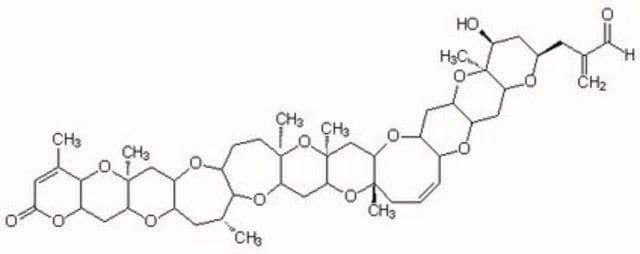203734-M
Brevetoxin PbTx-3, Ptychodiscus brevis
Lipid-soluble polyether marine toxin produced by the red tide dinoflagellate, Ptychodiscus brevis, found along the Gulf Coast of Florida.
Synonyme(s) :
Brevetoxin PbTx-3, Ptychodiscus brevis, Pumiliotoxin, Dihydrobrevetoxin B
About This Item
Produits recommandés
Niveau de qualité
Pureté
>95% (HPLC)
Forme
solid
Fabricant/nom de marque
Calbiochem®
Conditions de stockage
OK to freeze
Solubilité
ethanol: 10 mg/mL
DMSO: 30 mg/mL
acetonitrile: 30 mg/mL
chloroform: 30 mg/mL
methanol: 30 mg/mL
water: sparingly soluble
Température de stockage
−20°C
InChI
1S/C50H72O14/c1-25(24-51)14-28-17-37(52)50(8)41(54-28)19-33-34(61-50)18-32-29(55-33)10-9-12-46(4)42(58-32)23-49(7)40(62-46)21-39-47(5,64-49)13-11-30-44(60-39)26(2)15-31-36(56-30)22-48(6)38(57-31)20-35-45(63-48)27(3)16-43(53)59-35/h9-10,16,26,28-42,44-45,51-52H,1,11-15,17-24H2,2-8H3/b10-9-
Clé InChI
BKMHDYJRAAJTAD-KTKRTIGZSA-N
Description générale
Actions biochimiques/physiologiques
Voltage-dependent Na+ channel activator
Avertissement
Reconstitution
Autres remarques
Rein, K., et al. 1994. J. Org. Chem.59, 2107.
Edwards, R.A., et al. 1992. Mol. Brain Res.14, 64.
Trainer, V.L. 1991. Mol. Pharmacol.40, 988.
Tsai, M.C., and Chen, M.L. 1991. Br. J. Pharmacol.103, 1126.
Trainer, V.L., et al. 1990. ACS Symposium Series418, 166.
Baden, D.G., et al. 1988. Toxicon26, 97.
Poli, M.A., et al. 1986. Mol. Pharmacol.30, 129.
Shimizu, Y., et al. 1986. J. Am. Chem. Soc.108, 514.
Baden, D.G., et al. 1982. Toxicon19, 455.
Catterfall, W.A., and Risk, M. 1981. Mol. Pharmacol.19, 345.
Informations légales
Mention d'avertissement
Danger
Mentions de danger
Conseils de prudence
Classification des risques
Acute Tox. 1 Oral - Aquatic Acute 1 - Aquatic Chronic 1
Code de la classe de stockage
6.1A - Combustible acute toxic Cat. 1 and 2 / very toxic hazardous materials
Classe de danger pour l'eau (WGK)
WGK 2
Point d'éclair (°F)
Not applicable
Point d'éclair (°C)
Not applicable
Certificats d'analyse (COA)
Recherchez un Certificats d'analyse (COA) en saisissant le numéro de lot du produit. Les numéros de lot figurent sur l'étiquette du produit après les mots "Lot" ou "Batch".
Déjà en possession de ce produit ?
Retrouvez la documentation relative aux produits que vous avez récemment achetés dans la Bibliothèque de documents.
Notre équipe de scientifiques dispose d'une expérience dans tous les secteurs de la recherche, notamment en sciences de la vie, science des matériaux, synthèse chimique, chromatographie, analyse et dans de nombreux autres domaines..
Contacter notre Service technique









